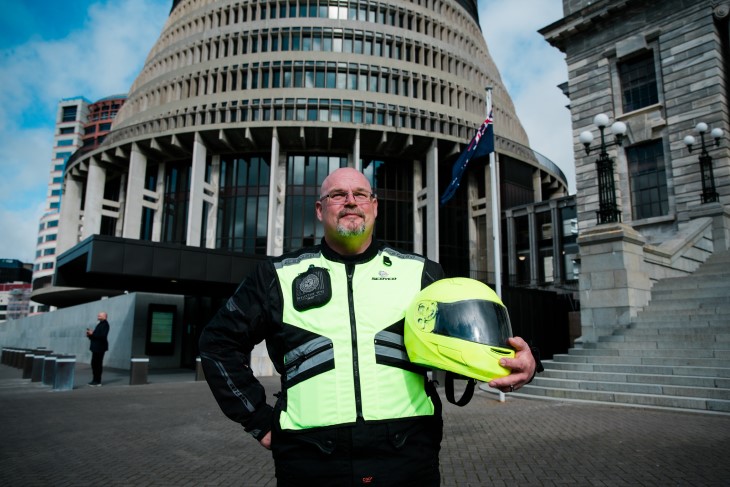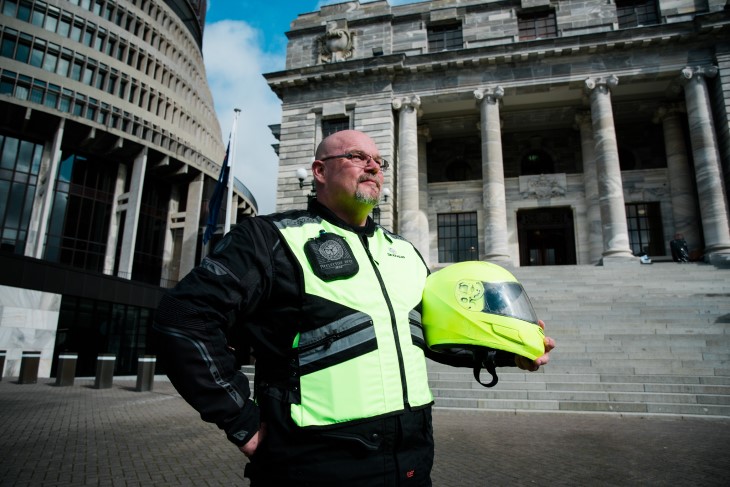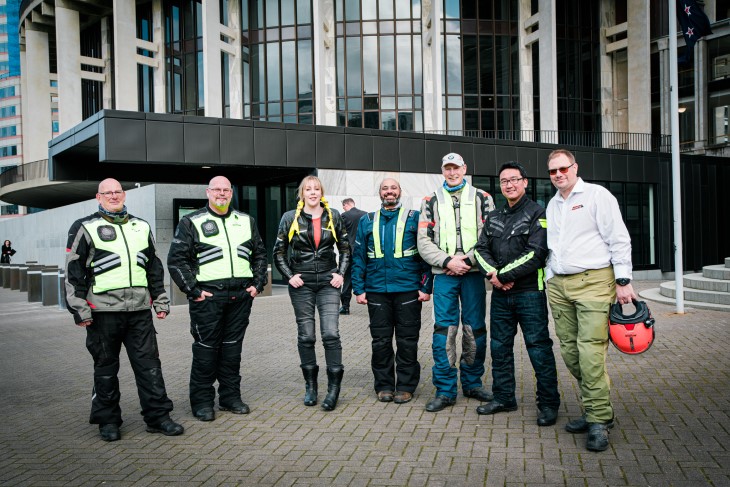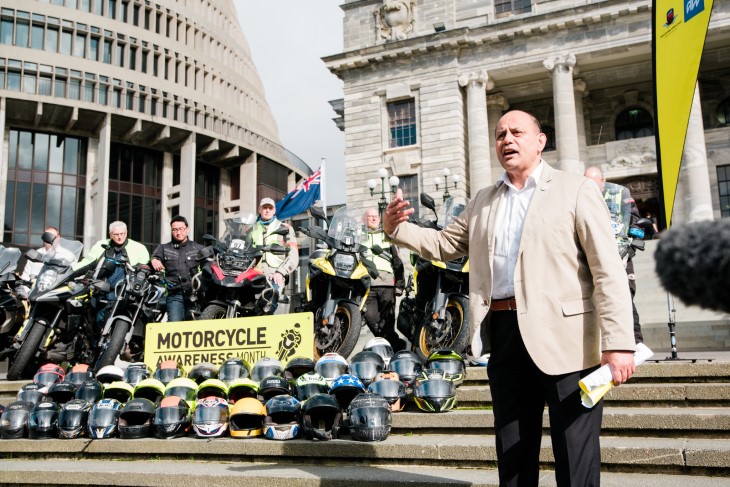Ross’ story: Helping others after a harrowing crash

Wanuiomata motorbike rider Ross Gratton was deeply affected by witnessing a serious accident as a teenager. Years on, he's investing time into ensuring riders have the skills to stay safe on our roads and is passionate about motorcycle safety.
There are some things in life you can’t unsee. Some moments that always stay with you.
Experienced motorbike rider and trainer Ross Gratton had one of those moments when he was 15. He was in the Remutaka Forest Park when he witnessed a horrific accident.
"This guy was a local goon and thought ripping around the Remutaka Forest Park drunk with no helmet on, was a good idea,” he says.
“He came off the bike and skidded on his face."
“I distinctly remember holding the skin flap of this guys’ skull while we waited for the ambulance to arrive. It was a deeply disturbing thing to see at a young age and it stayed with me.”
Since that moment, Ross knows you can hurt yourself badly on a motorbike.
“I never wanted to see that again for me or anyone I knew. Those things stay in your mind.” Ross says the rider suffered life-changing injuries.
“He had de-masked himself. He had removed the flesh from the bone. I think he lost sight in one eye and was severely disfigured for the rest of his life."
Ross played his part in saving the man’s life. On that day his passion for motorbike safety was born.
He was among the riders, with Minister Willie Jackson and Colin McGregor, Chair of the Motorcycle Safety Advisory Council (MSAC), at Parliament in September to support ACC launching Motorcycle Awareness Month.
On average 50 New Zealanders die in a motorbike crash every year on our roads.

Two Bald Bikers was born
It was around 2010, Ross says, when he signed up for advanced on-road training with the Institute of Advanced Motorists.
“I realised quickly that I was quite an experienced rider, but I had become experienced at being remarkably average,” he says.
That is when he met Stuart Nelson. They both lived in Wainui and would ride together. Over 18 months, they improved their skills to a higher level.
“It was a watershed moment. This works for me, why can’t it work for everyone else?” Ross remembers sitting around a coffee table with Stu and talking about how they could make a difference.
“We both had friends who had gone out riding and never came home. You have that thought, I can be part of the problem, or I can be part of the solution.
“We found that extra training makes all the difference.”
They found that there were great trainers in the motorcycle safety space but not necessarily good communicators. Two Bald Bikers was born in 2013.
“We started without a pot to piss in,” Ross says with a laugh. Ross knew Dave Keilty from the ACC Injury Prevention team and he started doing some Ride Forever work. They were one of the first companies in Wellington to get a contract.
“The rest is history. We have been steadily growing since then and we are now one of the larger Ride Forever provider south of Taupo,” he says proudly.
Two Bald Bikers are proud to offer the ACC Ride Forever subsidised training programme.
The difference between life and death
Ross loves the fact there is every chance that today he could give a rider something that could be the difference between life and death.
“I may never know that, but there is some essential nobility to what we do because we are certainly not out here to get rich.
It’s a real-world skill to help enjoying riding for as long as they are physically able to.
“For me when we are doing a learn to ride it is the ‘Aha moment’. You are giving them a tangible skill and their eyes light up and everything changes for them and that is awesome.”

Two Bald Bikers (left), pose with other motorcycle safety advocates at Parliament
Ross says that Ride Forever is now an established training programme and is imbedded into our society’s conscious.
“It’s accessible and affordable,” he says. “And the research shows that it is a highly effective training programme.”
Our data shows riders who have completed a Ride Forever coaching course are up to 50 percent less likely to lodge a motorcycle-related accident claim than non-trained riders.
“There’s also the aspect of I am in it as a group. I don’t have to feel so self-conscious. Someone might really want to ask a question that someone else wanted to ask but they were just too scared.
“Ride Forever is not a one and done course,” he says. “It should be part of every rider’s annual check-up.”
An ironic place to crash
“I call it an incident rather than an accident,” Ross says with a laugh.
While running a Ride Forever silver course in Upper Hutt he suffered a serious injury. The session was on emergency braking and Ross was asked by one of his clients to show him on his bike. It was a Japanese import cruiser, a Honda Shadow 400.
Ross completed an emergency breaking demonstration at 80km per hour. The front wheel locked and tucked under the bike.
The incident popped his left leg off the bike. His leg was fully extended when it dug into the ground and the bike pole-vaulted into the air.
“Everyone at the course heard the bone snap. I heard the bang and I wasn’t sure what had happened,” he says.
He brought the bike to a controlled stop but knew he had done some serious damage. “I realised that I couldn’t put any weight on my left leg,” he says. “The guys gave me a hand getting off the bike and we called an ambulance.”
Ross arrived at Hutt Hospital and the radiographer could not believe how badly Ross had broken his leg. He had a class three fracture of his tibia.
“The knuckle at the top of my tibia had shattered,” he says. Three days after the injury he went into surgery. They inserted a 160mm stainless steel plate and nine screws.

Minister Hon. Willie Jackson opens Motorcycle Awareness Month at Parliament, with Ross behind him
The long road to recovery
One moment stands out in Ross’ recovery. His two-year-old daughter visited him in hospital.
“She saw me sucking on a tube to keep my pain down, she just melted and couldn’t handle it. That broke my heart,” he says.
Ross was off work for seven months. He was unable to weight bear on his leg for four months, followed by three months of physiotherapy.
“ACC were brilliant throughout my recovery,” he says. “That support meant everything. Being the primary bread winner for the house and being flat on my back and unable to help was just hell.”
He received weekly compensation. All of my medical costs were covered and anything that he needed we provided.
“ACC paid for a special gel pad for my bike so my knee didn’t have to bend so much. Everything I needed was there for me.”
His bike weighs 350kg and Ross needed a high-tech knee brace which we provided. “It was a huge relief to know the money was coming in and also knowing that whatever I needed for my recovery was available.”
When demonstrating rider training, Ross only uses his own bike now.
“A smart man learns from his mistakes, but a wise man learns from the mistakes of others. I use myself as a cautionary tale. Here is what I did wrong, and this is what you can learn from it.”
For more visit Ride Forever below:




